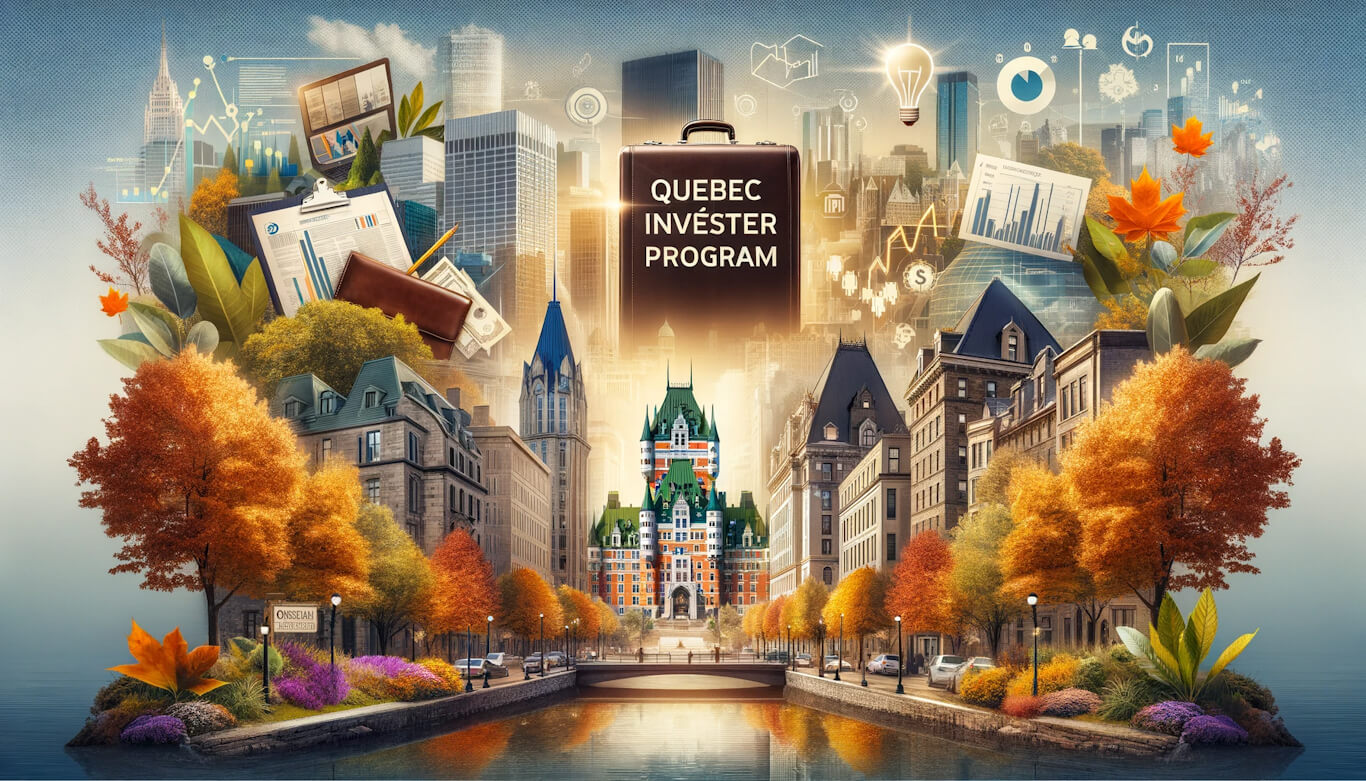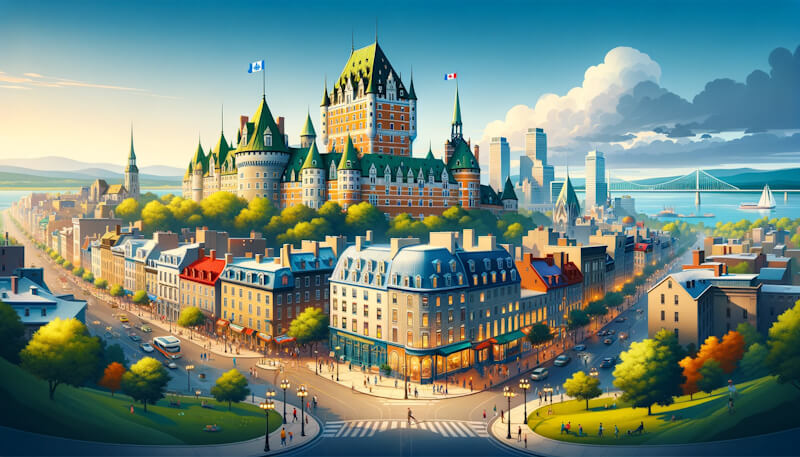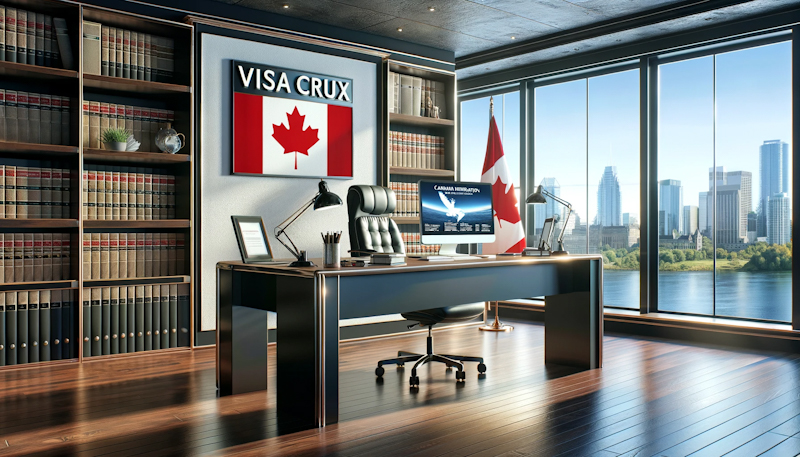Moving to Montreal: Your Complete Relocation Guide
Your Quick 30-Second Answer to Moving to Montreal, Canada !
Moving to Montreal involves considering several important factors. Montreal is known for its vibrant culture, diverse community, and bilingual environment, with French being the predominant language. The city offers a high quality of life, including affordable housing compared to other major Canadian cities, a robust public transportation system, and a rich array of cultural events and culinary experiences. Key sectors for employment include technology, aerospace, and healthcare. The city's education system is robust, with numerous reputable schools and universities. When moving, it's crucial to plan for the cost of living, including housing, utilities, transportation, and healthcare. Additionally, understanding the immigration and visa processes is vital for a smooth transition.
For an in-depth overview, please see the "Table of Contents" below.
Immigrate and Settle: Moving to Montreal, Your Ultimate Guide
Moving to Montreal is an exciting journey, and this guide provides all you need to know to successfully move, immigrate and settle in this vibrant city.
TABLE OF CONTENT
Introduction to the Guide
1. Who should use this Guide?
Planning Your Move to Montreal
2. Immigrate to Move and Settle
3. Moving: Practical Tips
4. Moving: Ideal Candidate
Opportunities and Integration
5. Professional and Educational
6. Cultural and Social Aspects
Settling Services and Adaptation
7. Practical, Essential Services
8. Adapting to Local Environment
9. Common Questions (FAQs)
10. Additional Resources

1. Who should use this Guide and Why?
This guide is intended for those considering a move to Montreal and seeking comprehensive insights about the relocation process. It's particularly valuable for individuals curious about Montreal's unique blend of cultures and those needing practical advice on navigating the Quebec Immigration Program. Whether you're drawn by Montreal's European charm or its dynamic North American lifestyle, this guide offers essential information and expert tips, making it an indispensable resource for prospective movers and immigrants.
2. Moving to Montreal: Immigrate and Settle

Moving to Montreal: Embracing La Belle Ville in the Heart of Quebec
Moving to a new city is an adventure filled with expectations, dreams, and, admittedly, a fair share of uncertainties. When that city is Montreal, Canada's vibrant and storied metropolis in the province of Quebec, the experience becomes even more unique. Montreal, often regarded as North America's piece of Europe, offers a blend of old-world charm and modern dynamism. For those considering moving to Montreal, understanding Quebec's immigration and the city's diverse facets is crucial to making a smooth transition.
Quebec Immigration Policy: A Gateway to Montreal
Quebec's distinctive immigration policy is key for anyone planning to move to Montreal. Unlike other Canadian provinces, Quebec has a special agreement with the Canadian government, allowing it to select immigrants who will adapt well to living in Quebec. If you're seeking to become a permanent residence, you'll navigate through processes like the Quebec Skilled Worker Program or the Quebec Experience Program, designed to assess your potential contribution to Quebec's society and economy. Work permit and study visas also come into play for temporary stays. However, the charm and opportunities of Montreal often turn temporary stays into lifelong commitments.
1. Quebec Skilled Worker Program (QSW)
- Eligibility: This points-based program requires skilled work experience, education, age, and language skills, among other criteria.
- Job Types: Engineers, IT professionals, healthcare workers, to name a few, are in demand.
- Hidden Factor: Depth of professional experience and transferable skills can greatly enhance your application.
2. Quebec Experience Program (PEQ)
- Eligibility: Experience in Quebec as a student or worker and an advanced intermediate knowledge of oral French.
- Job Types: Jobs that you may have held as a student intern or as part of a work-study program, like administrative support or technical assistance roles.
- Extra Mile: An understanding of Quebec's cultural nuances and past integration efforts can be persuasive.
3. Quebec Permanent Immigration Pilot Programs
- Common Conditions: Over 18, intent to settle in Quebec, and financial self-sufficiency.
- Artificial Intelligence Stream: Bachelor’s degree and relevant work experience in AI, with specific salary requirements based on location.
- Information Technologies and Visual Effects Stream: Quebec diploma of college studies or higher and relevant work experience in IT and visual effects sectors.
4. Quebec Business Immigration Programs
- Eligibility: Net assets of at least $2 million CAD and an investment of $1.2 million CAD through a financial intermediary.
- Hidden Factor: A robust investment plan that aligns with Quebec’s economic priorities can set you apart.
4.2. Quebec Entrepreneur Program
- Eligibility: Intend to manage a business in Quebec with sufficient funds.
- Job Titles: Business owner, startup founder under Quebec immigration program.
- Stand Out: A business plan that shows potential for growth and job creation in Quebec.
4.3. Quebec Self-Employed
- Eligibility: $100,000 CAD in net assets and two years of self-employed experience.
- Professions: Writers, artists, consultants.
- Hidden Factor: Demonstrating how your business will meet a specific need in Quebec's market can highlight your application.
Moving to Montreal, with its vibrant culture, diverse population, and dynamic lifestyle, is an exciting prospect. Whether it’s the rich history, the excellent food, or the numerous festivals, there’s something in Montreal for everyone. Embrace the process, from navigating Quebec’s immigration policies to exploring your new neighborhood. Montreal is a city that welcomes all with open arms, and soon, it will feel like home.
3. Moving to Montreal: Practical Tips
Housing and Living: Finding Your Niche in Montreal
Finding a home in Montreal, whether it's a cozy one-bedroom apartment in the trendy Mile End or a family house near Mount Royal, is an exciting part of the move. The city offers a range of housing options, from the historic charm of Old Montreal to the bustling streets of the downtown core. The affordable cost of living compared to other major cities is a plus, though it's wise to consider the slightly higher taxes in Quebec.
Exploring Neighborhoods: Diversity in Every Corner
Montreal's neighborhoods each tell a different story. The Downtown core pulsates with the energy of business and shopping, while Old Montreal offers a journey back in time with its cobblestone streets and historic buildings. For those who appreciate the arts and a bohemian vibe, the Plateau Mont-Royal and Mile End are must-explore areas. Families might gravitate towards quieter, more residential areas like Westmount or Outremont, which offer proximity to some of the city's best schools and parks.
Lifestyle and Entertainment: Enjoying Montreal's Offerings
Montreal's lifestyle is an eclectic mix of North American modernity and European charm. The city's numerous cafes, restaurants, and bars offer a variety of cuisines and experiences. The Montreal International Jazz Festival and Just for Laughs are just a few of the events that make the city a hub for arts and culture. For those who enjoy outdoor activities, Mount Royal provides a scenic escape within the city, offering trails, lookouts, and even a small lake.
Work-Life Balance: A City That Knows How to Live
Montrealers value their work-life balance. The city is bustling with professional opportunities, but it also understands the importance of taking time to enjoy life. This is evident in the number of public parks, the popularity of happy hour in bars and restaurants, and the cultural events that fill the city's calendar.
Preparing for Moving to Montreal: Practical Aspects
- Documentation: Ensure all your immigration documents, including visas and work permits, are in order.
- Housing: Research and secure housing, considering factors like proximity to work, schools, and amenities.
- Finances: Set up a Canadian bank account and understand the basics of managing finances in Canada, including understanding the tax system and available financial services.
- Education: For families, exploring schooling options and enrolling children in suitable schools is crucial.
- Healthcare: Register for the Quebec health insurance plan as soon as you arrive.
Settling In: Practical Tips for Newcomers
- Housing: Research neighborhoods to find the best fit for your lifestyle and budget. Consider proximity to work, schools, and public transportation for easy access.
- Healthcare: Register with the RAMQ upon arrival to access public healthcare services.
- Banking and Finances: Open a local bank account and get acquainted with Canadian banking practices. Be aware of the tax implications and available financial services.
- Transportation: Explore the city's public transportation options. Montreal's extensive network of buses, metros, and trains makes getting around straightforward.
- Networking: Connect with local communities and expat groups. They can be invaluable resources for tips, advice, and friendship.
4. Moving to Montreal, Quebec as an Ideal Candidate

In the quest to move to Montreal, Quebec's unique immigration programs offer a pathway, but standing out as an applicant requires strategic planning and a deep understanding of the government's policy objectives. This section delves into the essential strategies for enhancing your application, emphasizing the importance of showcasing unique skills, cultural adaptability, and the potential to contribute significantly to Quebec's societal and economic fabric.
1. Understanding Policy Objectives
- Quebec's immigration programs are designed not just to fill immediate labor gaps but to enrich the province's cultural and economic landscape. Understanding this can guide applicants to tailor their applications to align with these broader objectives. For instance, demonstrating an ability to contribute uniquely to Quebec's diverse sectors, including technology, arts, or academia, can be a significant advantage.
2. Adding Value Beyond Basic Skills
- Specialized Expertise: Quebec values applicants with specialized skills that can contribute to its growth sectors. If you have expertise in areas like AI, gaming, or renewable energy, highlight this in your application.
- Entrepreneurial Spirit: Demonstrating a track record of innovation or entrepreneurship can make your application stand out. Quebec appreciates individuals who can contribute to its vibrant startup ecosystem.
3. Demonstrating Cultural Adaptability
- Language Proficiency: Fluency in French is a significant asset in Quebec. Even basic proficiency, coupled with a commitment to improve, shows adaptability.
- Cultural Engagement: Expressing a genuine interest in Quebec's culture, history, and societal norms reflects your willingness to integrate. This can be communicated through past experiences or future intentions to engage with local communities.
4. Showcasing Unique Contributions
- Community Involvement: Illustrate how you plan to contribute to the local community, be it through volunteering, cultural exchange, or community leadership.
- Diverse Perspectives: If you come from a background that brings new perspectives to Quebec, highlight this. Diversity in thoughts and experiences is highly valued.
5. Communicating Effectively in Your Application
- Strong Narrative: Develop a compelling narrative that ties your background, skills, and aspirations with what you can offer to Quebec. Storytelling can make your application memorable.
- Evidence of Achievements: Back your claims with tangible evidence. This could be in the form of awards, publications, or letters of recommendation.
6. Enhancing Your Profile
- Continuous Learning: Show a commitment to lifelong learning. Online courses, certifications, and attending relevant workshops can demonstrate this.
- Online Presence: Maintain a professional online presence. Platforms like LinkedIn can showcase your career trajectory and professional network.
- Participation in Tech Forums and Communities: Active participation in professional forums, especially in your field of expertise, can add weight to your application.
7. Unique Perspectives and Unseen Aspects of Moving to Montreal
- Digital Footprint: In today’s digital age, a clean and impressive digital footprint can be an asset. Regular contributions to blogs, industry websites, or online discussions can showcase your expertise and engagement.
- Local Adaptability: Indicate your readiness to adapt to the local environment in Montreal. This could be through your willingness to experience the city's unique blend of North American and European cultures, your enthusiasm for the French language, or your eagerness to be part of Montreal's diverse community.
Conclusion
Applying for Quebec's immigration programs requires more than meeting the basic eligibility criteria. It's about presenting yourself as a valuable, adaptable, and unique individual who can enrich the province's cultural and economic landscape. By focusing on strategic recommendations like showcasing specialized skills, demonstrating cultural adaptability, and maintaining a strong, relevant online presence, you can significantly enhance your application's quality and stand out in the competitive process. Remember, Quebec is looking for individuals who not only aspire to live in its cities but also contribute to their vibrant, dynamic communities.
5. Professional and Educational Opportunities in Montreal, Quebec
1. Professional Life: Opportunities and Growth
Montreal's job market is as diverse as its culture. From burgeoning tech startups to established finance firms, the city is ripe with job opportunities for young professionals and experienced veterans alike. Landing a job offer in Montreal often means embracing its diverse industries and bilingual work environment, a testament to the city's economic vibrancy.
2. Education: A Blend of Culture and Learning
Education in Montreal is a tapestry of culture and high academic standards. The city boasts renowned institutions like McGill University and the Université de Montréal, catering to a diverse range of academic and research interests. For families moving to Montreal, understanding the dynamics of public schools and private schools is vital. The English Montreal School Board and French-language schools offer high-quality education, ensuring that your children are not just learning academically but also becoming bilingual, an invaluable skill in this bilingual city.
3. The Educational Landscape: Schools and Universities
Montreal is a hub for international students and families looking for quality education. The city hosts world-class universities like McGill University and Concordia University, attracting students globally. For families, the choice between English-speaking and French-speaking schools is significant. The English Montreal School Board and various private institutions offer diverse options. Integrating into the local educational system provides an immersive experience, especially for children in elementary school and high school, blending academic excellence with language acquisition.
4. Navigating the Job Market: Opportunities Abound
Montreal’s economy is diverse, offering opportunities in industries ranging from aerospace to technology to creative arts. The city is increasingly becoming a hub for startups, attracting young professionals and experienced experts alike. For those moving with a job offer in hand, integrating into the workplace can be a smooth process, especially in Montreal's typically bilingual work environments. Networking and making local connections are crucial for job seekers, as many opportunities are often found through word-of-mouth or local networks.
Conclusion: Embracing Montreal, Your New Home
Moving to Montreal is more than a change of address; it's the start of a new chapter in a city rich in history, culture, and opportunities. From the moment you start navigating Quebec's immigration policies to the day you feel the rhythm of Montreal's lifestyle, each step is an exciting part of the journey. Welcome to Montreal, a city that’s waiting to embrace you with open arms and a warm heart.
6. Cultural Integration and Social Aspects of Montreal, Quebec

1. Language: Navigating the Bilingual Tapestry
Montreal's primary languages are French and English, creating a unique linguistic landscape. For English speakers and French speakers, the city is a ground of commonality and learning. While the official language is French, most Montrealers are impressively bilingual. This linguistic diversity enriches the local culture and eases the language barrier for newcomers.
2. Language Learning: Embracing Bilingualism
For many, moving to Montreal means diving into a bilingual environment. While French is the primary language, English is widely spoken. Taking French classes can greatly enhance your experience and ease your integration. The city offers numerous language learning opportunities, from formal courses at institutions like McGill University to informal language exchange meetups.
3. Cultural Events and Landmarks: The Heartbeat of Montreal
Montreal is a city that celebrates life and culture. Events like the Montreal Jazz Festival and the Montreal World Film Festival highlight the city's artistic diversity. Landmarks such as the Old Port, Lachine Canal, and the vibrant Jean-Talon Market offer glimpses into the city's rich history and contemporary spirit. The City of a Hundred Steeples reflects not just its architectural wonders but also its spiritual diversity.
4. The Arts and Cultural Scene: A Melting Pot of Inspirations
Montreal is often referred to as the "City of a Hundred Steeples" due to its many beautiful churches, but its cultural landscape extends far beyond. The city is a canvas of artistic expressions, from the murals of Plateau Mont-Royal to the performances at Place des Arts. Iconic figures like Leonard Cohen have left an indelible mark on the city’s cultural identity. Regular festivals, including the Montreal World Film Festival and Montreal Jazz Festival, showcase the city's love for arts and music, drawing talents and audiences from all over the world.
5. Entertainment and Leisure: Discovering Montreal's Joys
Montreal is a city that loves to have fun. The International Jazz Festival, Just for Laughs, and a host of other events fill the calendar, offering entertainment options for all tastes. The city's vibrant nightlife, cafe culture, and diverse dining scene mean that there's always something new to explore. For quieter moments, the many parks and green spaces offer a peaceful retreat from the urban hustle.
6. The Culinary Scene: A Foodie’s Paradise
Montreal's food scene is as diverse as its population. From the famous smoked meat sandwiches to poutine, the city offers a range of culinary experiences. The Jean-Talon Market and Atwater Market are meccas for food lovers, offering fresh, local produce and gourmet goods. Montreal's restaurant scene also reflects its multiculturalism, with cuisines from around the world.
Conclusion
Moving to Montreal is a journey filled with exciting opportunities, cultural discoveries, and personal growth. Whether it's through strolling the historic streets of Old Montreal, participating in the vibrant festivals, or enjoying the city's culinary delights, your experience in Montreal will be as rich and diverse as the city itself. With proper preparation, an open mind, and a willingness to embrace the new, your move to Montreal will mark the beginning of an unforgettable chapter in your life.
7. Practical and Essential Services in Montreal, Quebec
Communication and Technology: Staying Connected
In today's world, effective communication is key. In Montreal, managing your cellular phone information and choosing the right phone plan is part of settling in. The city's infrastructure supports a robust network, ensuring that receipt of cellular phone calls and SMS text messages is seamless, helping you stay connected with ease.
Financial and Legal Aspects: Navigating the Basics
Relocating also involves understanding the financial and legal landscape. From opening a bank account to navigating federal taxes and sales taxes, being informed eases the transition. Montreal's strong customer service culture ensures that newcomers receive the necessary guidance, whether it's related to finance, healthcare, or legal matters.
Healthcare: A Fundamental Consideration
Quebec’s healthcare system is accessible to all residents, including immigrants. Once you've made your move, registering for the Régie de l'assurance maladie du Québec (RAMQ) should be one of the first things you do. Finding a family doctor and understanding the healthcare services available in your area are important steps in settling down. Montreal's hospitals and clinics are known for their quality of care, though it's worth noting that the system can be busy, and wait times can vary.
Health and Wellness: Navigating Healthcare in Montreal
Upon moving, registering for Quebec's health insurance plan is essential. Montreal has a robust healthcare system, with numerous hospitals, clinics, and specialized health services. While the system is efficient, newcomers should be prepared for potentially longer wait times for certain services. Finding a family doctor or a local clinic for regular check-ups is a wise step for new residents.
Transportation: Getting Around the City
Montreal’s public transportation system is extensive and efficient, encompassing buses, the metro, and commuter trains. Owning a car in the city is an option, but not a necessity, thanks to the widespread availability of public transit. The city is also friendly to cyclists, with numerous bike lanes and paths, including those along the beautiful Lachine Canal.
Concluding Thoughts
Moving to Montreal is not just a change of address; it's an embrace of a new way of life. The city's European influences, diverse cultural fabric, and dynamic lifestyle make it an ideal destination for those seeking a blend of tradition and modernity. As you prepare for your big move, remember that every step, from securing a work visa to enjoying a happy hour in a local bistro, is a step towards becoming part of Montreal's vibrant community. Bonne chance!
8. Adapting to the Local Environment in Montreal, Quebec

Weather and Environment: Embracing the Seasons
One cannot discuss moving to Montreal without mentioning its cold winters and beautiful summers. The city transforms with the seasons, from snowy landscapes to lush green parks. While harsh winters are a reality, they also bring about unique experiences like ice skating in downtown or the cozy ambiance of a café in the Little Italy neighborhood.
Embracing the Climate: More Than Just Winters
Montreal's climate is characterized by its distinct seasons. While harsh winters are a hallmark, they also bring unique experiences like the Fête des neiges festival. Spring brings a burst of colors, summers are warm and full of outdoor activities, and fall is a picturesque tapestry of red and orange leaves. Each season offers its own charm and a range of activities, from skiing on Mount Royal in the winter to picnics in Parc Jean-Drapeau in the summer.
With July 1st, an iconic date in Quebec City, the city's festive spirit, often referred to as the "City of Saints," is palpable. Whether it's your first time navigating the winter months in Montreal, known for its alternative rock scene, or you're returning to an English school or one of its major universities, every moment here promises new discoveries. Planning to arrive next week? Remember to update your cell phone number and account information as your first thing upon arrival. This city offers the best way to experience Canada's rich heritage and dynamic future, making it a good idea to stop transaction calls on your automatic telephone, so you can fully immerse yourself in this great place.
And for those making a permanent residency, becoming part of a community where every per cent of effort counts towards building a fulfilling life is an exciting prospect. So, good luck as you embark on this journey to Montreal, a city where both the long distance move and everyday living become adventures of their own, making it the best option for many seeking a new home.
In conclusion, Montreal, Quebec's metropolis and Canada’s second-largest city, is not just a good place, but also one of the best places to live in North America. Often likened to New York City, this best city offers a unique blend of culture and convenience. Downtown Montreal, the vibrant city centre, is renowned for its accessibility and proximity to major Canadian cities and surrounding areas. The health care system in Montreal provides peace of mind, crucial for families and individuals moving to Montreal. Remember, as the Montreal Gazette often highlights, Montreal is a city of great things, welcoming every new Canadian citizen with open arms.
9. Common Questions (FAQs) about Moving to Montreal, Quebec
What is the cost of living in Montreal compared to other major Canadian cities?
What is the cost of living in Montreal compared to other major Canadian cities?
Montreal is generally more affordable than cities like Toronto or Vancouver, particularly in terms of housing and daily essentials.
How does the healthcare system work for new immigrants in Montreal?
How does the healthcare system work for new immigrants in Montreal?
New immigrants in Montreal can access public healthcare after obtaining a health insurance card. There is a waiting period, during which private health insurance is advisable.
What are the job opportunities for immigrants in Montreal?
What are the job opportunities for immigrants in Montreal?
Montreal has a diverse economy with job opportunities in sectors such as technology, aerospace, and finance. Being bilingual is an advantage in the job market.
Is knowledge of French mandatory for living in Montreal?
Is knowledge of French mandatory for living in Montreal?
While not mandatory, knowing French in Montreal is beneficial for social integration and accessing more employment opportunities.
What are the best neighborhoods for families in Montreal?
What are the best neighborhoods for families in Montreal?
Family-friendly neighborhoods in Montreal include Westmount, Outremont, and Le Plateau-Mont-Royal, known for their safety, parks, and schools.
How does the education system in Montreal cater to international students?
How does the education system in Montreal cater to international students?
The education system in Montreal is welcoming to international students, offering programs in both English and French, along with cultural support services.
Can I work in Montreal on a student visa?
Can I work in Montreal on a student visa?
On a student visa, you can work up to 20 hours per week during academic sessions and full-time during scheduled breaks.
What are the public transportation options in Montreal?
What are the public transportation options in Montreal?
Montreal offers efficient public transportation, including buses and the Metro, facilitating easy navigation around the city without a car.
What are the unique cultural experiences Montreal offers?
What are the unique cultural experiences Montreal offers?
Montreal is renowned for its festivals, vibrant arts scene, and culinary experiences that blend French and North American influences.
How does Montreal's climate vary throughout the year?
How does Montreal's climate vary throughout the year?
Montreal experiences four distinct seasons, including warm summers and cold, snowy winters. Preparing for the winter weather is important.
These FAQs provide further clarity on various aspects of moving to Montreal. Always refer to official guidelines and consult with immigration experts for the most accurate and up-to-date information tailored to your specific situation.
10. Where to Find Resources about moving to Montreal , Quebec?
To stay updated with the latest rules and regulations, application processes, forms, and other details related to moving to Montreal, Quebec, consider visiting these government websites: Immigrate to Quebec

Kamal Akhtar is a Canadian immigration lawyer licensed by the Law Society of Ontario. Based in Ontario, Canada. Kamal has years of experience helping foreign nationals with immigration applications and appeals. He specializes in Canadian immigration law and other complex entry solutions. Kamal dedicates himself to delivering honest, strategic, and client-centered legal solutions for every case.
Kamal's credentials include a Bachelor of Law (LL.B.) and a Master of Law (LL.M.) from Osgoode Hall Law School in Toronto. Kamal is a noted member of professional associations like the Canadian Immigration Lawyers Association (CILA), the Canadian Association of Professional Immigration Consultants (CAPIC), the Canadian Bar Association (CBA), and the Ontario Bar Association (OBA). Over 20 years of legal experience shape Kamal's insights.
Please note that the information provided on this website does not constitute legal or professional advice.
Phone: +1 (289) 216-4666 | Fax: +1 (289) 778-4745 | Email: info@kamallaw.ca



